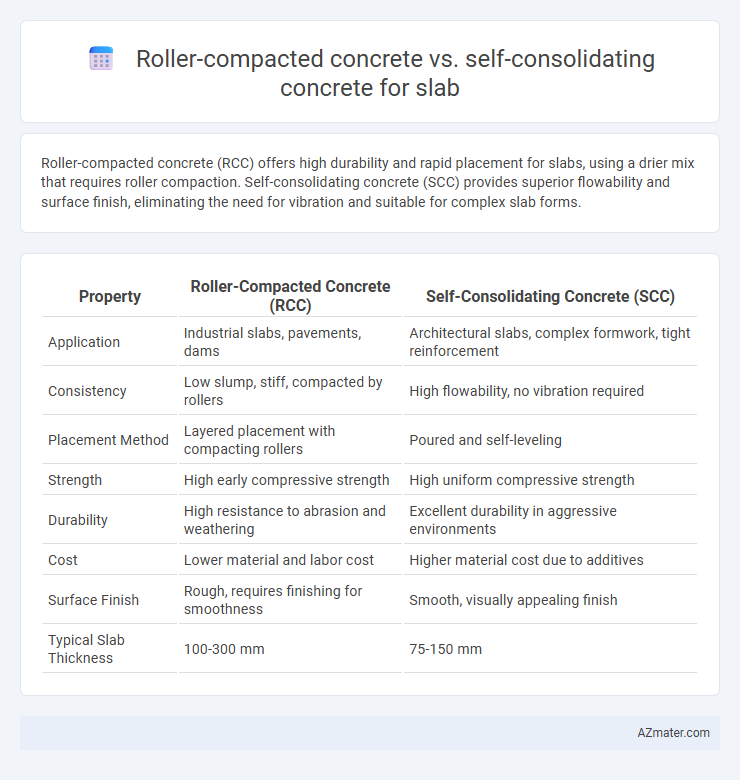Roller-compacted concrete (RCC) offers high durability and rapid placement for slabs, using a drier mix that requires roller compaction. Self-consolidating concrete (SCC) provides superior flowability and surface finish, eliminating the need for vibration and suitable for complex slab forms.
Table of Comparison
| Property | Roller-Compacted Concrete (RCC) | Self-Consolidating Concrete (SCC) |
|---|---|---|
| Application | Industrial slabs, pavements, dams | Architectural slabs, complex formwork, tight reinforcement |
| Consistency | Low slump, stiff, compacted by rollers | High flowability, no vibration required |
| Placement Method | Layered placement with compacting rollers | Poured and self-leveling |
| Strength | High early compressive strength | High uniform compressive strength |
| Durability | High resistance to abrasion and weathering | Excellent durability in aggressive environments |
| Cost | Lower material and labor cost | Higher material cost due to additives |
| Surface Finish | Rough, requires finishing for smoothness | Smooth, visually appealing finish |
| Typical Slab Thickness | 100-300 mm | 75-150 mm |
Introduction to Modern Concrete Solutions for Slabs
Roller-compacted concrete (RCC) offers high-density and durability for slabs requiring heavy load-bearing capacity, utilizing a dry mix that is compacted by heavy rollers. Self-consolidating concrete (SCC) provides superior flowability and homogeneous filling without mechanical vibration, ideal for complex slab forms and enhancing surface finish and structural integrity. Both RCC and SCC represent advanced concrete technologies improving construction efficiency, performance, and longevity of modern slabs.
What is Roller-Compacted Concrete (RCC)?
Roller-compacted concrete (RCC) is a dry mix concrete placed with conventional asphalt paving equipment and compacted by vibratory rollers, offering high density and strength without the need for forms or finishing. RCC is composed of cement, aggregates, and water but has a low slump, making it ideal for large-scale slabs requiring rapid construction and durability, such as pavements and dams. Its economical material usage and mechanical compaction reduce labor and equipment costs compared to self-consolidating concrete (SCC), which relies on flowability and self-leveling properties for placement.
What is Self-Consolidating Concrete (SCC)?
Self-consolidating concrete (SCC) is a highly flowable, non-segregating concrete that spreads into place and fills formwork without the need for mechanical vibration. Its unique rheological properties enhance workability and reduce labor costs, making it ideal for complex slab structures and densely reinforced areas. Compared to roller-compacted concrete (RCC), SCC provides superior surface finish and uniformity, especially important for slabs requiring precise dimensional tolerances and smooth finishes.
Key Material Properties: RCC vs. SCC
Roller-compacted concrete (RCC) features low water content and high aggregate volume, resulting in high compressive strength and excellent durability for heavy-duty slabs. Self-consolidating concrete (SCC) offers superior flowability and segregation resistance due to its high paste content and use of superplasticizers, enabling it to fill complex forms without vibration. RCC emphasizes density and mechanical strength through compaction, while SCC prioritizes workability and surface finish quality through self-leveling properties.
Placement Techniques and Equipment Comparison
Roller-compacted concrete (RCC) requires heavy compaction equipment such as vibratory rollers to achieve its dense structure, making it ideal for large-scale slabs with rapid placement and minimal finishing. Self-consolidating concrete (SCC) relies on its high fluidity and viscosity-modifying admixtures to flow and settle under its own weight, eliminating the need for vibration and enabling placement with standard pouring equipment and minimal labor. The placement techniques for RCC focus on sequential layer compaction, while SCC emphasizes careful pouring to avoid segregation, offering smoother finishes and superior surface quality for slabs.
Surface Finish and Appearance Considerations
Roller-compacted concrete (RCC) offers a rougher surface finish suited for heavy-duty industrial slabs, providing excellent skid resistance but limited aesthetic appeal. Self-consolidating concrete (SCC) delivers a smooth, uniform surface with superior visual quality, ideal for architectural slabs requiring fine detailing and minimal surface blemishes. SCC's high flowability enables complex formworks and reduces surface voids, enhancing the slab's overall appearance compared to the dense, textured surface of RCC.
Strength and Durability Performance
Roller-compacted concrete (RCC) offers high compressive strength and excellent durability due to its low water-cement ratio and dense matrix, making it ideal for heavy-duty slabs subjected to high loads. Self-consolidating concrete (SCC) provides uniform strength and enhanced durability by eliminating segregation and voids, ensuring superior surface finish and long-term performance under dynamic conditions. Both RCC and SCC exhibit robust strength and durability performance, but RCC is preferred for large-scale, high-wear slabs while SCC suits complex formwork and precision applications.
Cost Analysis and Construction Speed
Roller-compacted concrete (RCC) typically offers lower material and labor costs compared to self-consolidating concrete (SCC) due to its minimal need for formwork and reduced cement content, making it cost-effective for large slab projects. RCC's placement speed is significantly faster as it is laid using heavy machinery without the need for vibration, which reduces construction time substantially. In contrast, SCC demands higher costs for specialized admixtures and formwork, but its excellent flowability allows for faster installation in complex slab geometries, improving speed where intricate designs are involved.
Ideal Applications: Slab Types and Project Suitability
Roller-compacted concrete (RCC) is ideal for large-scale, high-strength pavement slabs such as industrial floors and highway pavements due to its rapid placement and cost efficiency. Self-consolidating concrete (SCC) is best suited for slabs requiring complex formwork or dense reinforcement, including architectural finishes and bridge decks, because of its superior flowability and consolidation without vibration. Selecting RCC or SCC depends on project scale, structural complexity, and surface finish requirements.
Environmental Impact and Sustainability Factors
Roller-compacted concrete (RCC) offers enhanced sustainability through its lower cement content and reduced water usage, resulting in a smaller carbon footprint compared to traditional concrete mixes. Self-consolidating concrete (SCC) requires higher cement and chemical admixtures, which can increase environmental impact but provides superior surface finish and reduced labor, potentially lowering lifecycle emissions. Both RCC and SCC contribute to sustainable construction when optimized for project-specific requirements, balancing material efficiency with performance and durability.

Infographic: Roller-compacted concrete vs Self-consolidating concrete for Slab
 azmater.com
azmater.com